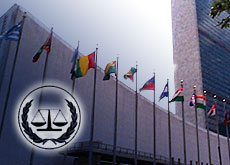Swiss still hope for strong world court

Switzerland says it remains committed to a strong International Criminal Court (ICC), despite a European Union move which experts say could undermine the body.
The Swiss reaffirmed their support for the court after the EU said its members could exempt American citizens from prosecution.
“We certainly don’t wish to see a weakening of the court,” Daniela Stoffel of the Swiss foreign ministry told swissinfo. “We will see how the court will proceed. It’s not that it is weakened by this decision of the EU, but it will have to prove that it can do the work it was created to do.”
The United States is concerned that the court, which is designed to be a permanent body for the prosecution of war crimes and crimes against humanity, could be exploited for political purposes.
Ever since the ICC received the required 60 ratifications for setting it up, the US has been putting pressure on European countries to grant immunity to American citizens, in particular to members of the US military serving overseas.
Swiss refusal
In August Swiss foreign minister Joseph Deiss revealed that Switzerland had been asked to grant exemptions to US citizens, but had refused. Deiss said Switzerland believed there should be no exceptions to the rule of the court.
Norway, which like Switzerland is not a member of the EU, also rejected US requests for immunity.
On Monday however the EU announced that its members were free to negotiate deals with the US granting American troops limited immunity from prosecution by the ICC.
“We don’t regret not granting these exemptions,” said Stoffel. “In fact they would be superfluous anyway, because Switzerland does not have American troops on its soil.”
“We see the EU’s decision not as a compromise but as a solution to give member states some fairly narrow room for manoeuvre should they want to make special agreements with the US,” Stoffel continued.
“We can’t of course interfere in any decision the EU has taken,” she continued. “But we wish for a strong ICC, as strong as possible.”
Human rights groups angry
Human rights groups have been quick to condemn the EU’s decision – Amnesty International called the move “a step back” and said it shifted the terms of the debate about the court from legal principle to political opportunism.
In Geneva, the International Commission of Jurists expressed disappointment at the EU’s action. The ICJ has long campaigned for a permanent court to prosecute war crimes.
“It’s especially disappointing that a powerful body like the EU should cave in to US pressure when smaller countries [like Switzerland and Norway] didn’t,” said secretary general of the ICJ Louise Doswald Beck.
“It would have been a lot better if the EU could have been united on this,” Beck told swissinfo. “It could have sent a message to the whole world that serious international crimes must not have any kind of immunity at all.”
Credibility in question
It remains to be seen just how many European Union members will actually negotiate immunity terms with the US, although Britain, Italy, and Spain have already indicated that they are preparing to do so.
“We don’t see all 15 members of the EU making these arrangements with the US,” said Daniela Stoffel. “We’ll just have to wait and see which countries deem it necessary.”
But Louise Doswald Beck remains concerned that the very principles on which the ICC was initially founded may now be called into question.
“I think this does undermine the credibility of the court,” Beck said. “People may now become cynical and believe that there is justice for some countries and not for others.”
“That is profoundly disappointing, and precisely what this court should avoid.”
swissinfo, Imogen Foulkes
The Rome Statute for the International Criminal Court came into force on July 1, 2002.
The ICC – based in The Hague – is expected to begin work in January 2003.
Washington has refused to ratify the court and is trying to persuade other countries to grant US citizens immunity from prosecution.
Switzerland has refused, but the EU has left that decision to individual member states.

In compliance with the JTI standards
More: SWI swissinfo.ch certified by the Journalism Trust Initiative



You can find an overview of ongoing debates with our journalists here . Please join us!
If you want to start a conversation about a topic raised in this article or want to report factual errors, email us at english@swissinfo.ch.